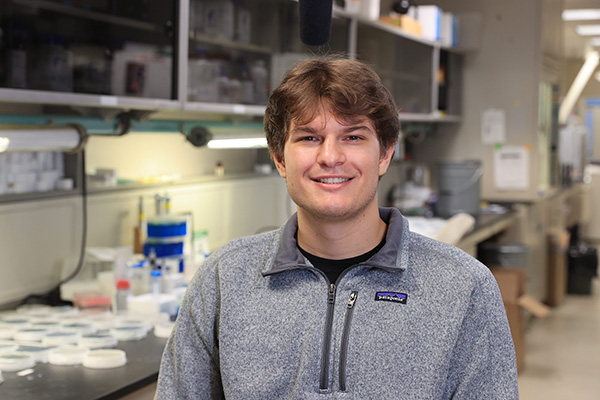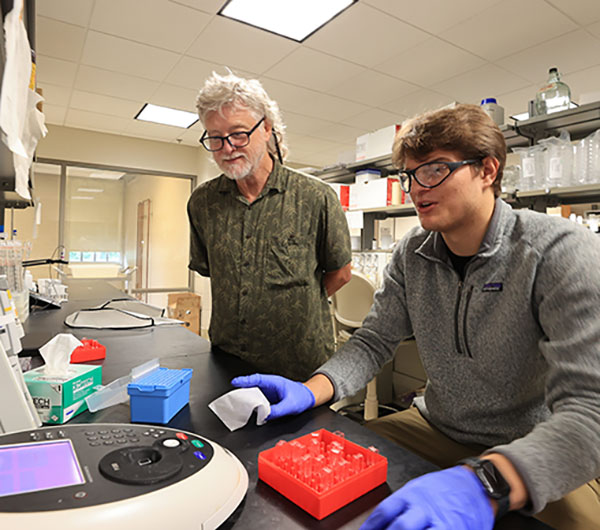Undergraduate Summer Scholar gains independence and leadership skills through research opportunities
‘Because of Miami, I was able to exceed my expectations beyond anything I could ever imagine," Patrick Lakeberg said

Undergraduate Summer Scholar gains independence and leadership skills through research opportunities
As the youngest of seven, Patrick Lakeberg ’27, a Biology major with a Premedical and Pre-Health Studies co-major, often frequented Miami University’s campus while growing up because four of his siblings attended Miami, and one also attended Miami for graduate school. So, when the time came for him to decide where to attend college, the answer was simple.
“It was honestly just written up for me to come to Miami,” he said.
Creating connections
Something that Lakeberg didn’t expect when he came to college: finding community. In fact, he said his favorite thing about Miami is the culture and how there’s so much passion behind students’ academics, internships, and other opportunities. Lakeberg thought everyone was going to be doing their own thing and not joining together — but he found just the opposite.
“I just feel like everything about Miami is just it's really big in culture — like you're going to find your community, and that's really nice. And I feel like it's something I never really would have expected coming into college,” he said.
In addition to building relationships with fellow students, he experienced early on how much Miami faculty members care. Lakeberg mentioned that he’s very grateful to David Russell, associate teaching professor of Biology, and his teaching style for helping to make the transition from high school to college easier.
“I have to shout out Dr. David Russell. He was my Biology 116 and 115 teacher. He was an amazing professor. He cared so deeply about the subject, about his students,” Lakeberg said. “I learned more about myself, about my study habits, and about how I'm going to approach for future classes from that class.”

Building research skills
Prior to coming to Miami, Lakeberg had his doubts about what he could achieve. Once he got here, though, he feels he really started to succeed. “All it takes is just a little hard work and some amazing faculty to make you be able to reach your goals,” he said.
During summer 2025, he participated in the Undergraduate Summer Scholars (USS) program — a 10-week program offering funded research experience with faculty mentors for undergraduate students at Miami — along with his mentor, Michael Kennedy, Ohio Eminent Scholar of Structural Biology and professor of Chemistry and Biochemistry.
Lakeberg credits the USS program — and the autonomy that goes along with it — for helping to advance his education, nurture his passion for science, and gain leadership skills. While he’d done some research prior to joining the program, he hadn’t been fully immersed into the process yet.
“Once I learned about the USS program from one of the former graduate students, I was able to control my own project, run my own research project, do my own experiments, interpret my own results. And I feel like that just exploded my passion for research, being able to have full control,” he said.
His research project — one that he’s been working on since his first year at Miami — focuses on the function of pentapeptide repeat proteins (PRPs). While these proteins are typically found in cyanobacteria, their function is unknown.
“My summer research project is more towards a gene called alr5209. It's a type of protein that we don't know anything about. It's called pentapeptide repeat protein. That's the fancy name for it, but it's essentially just one specific type of protein with one specific little like kink in it. And then that makes it special to all the other proteins,” he said. “For my project, I cut out that gene that produces that protein — alr5209 — and I grew up a culture of cells that had the exact same thing as the wild type of the cell.”
Making a difference
In addition to learning about and testing the metabolic activities in the cell of interest, Lakeberg knows the importance that his research on PRPs can offer. “Scientists theorize that cyanobacteria were the first organisms to do photosynthesis in the entire world,” he said. “If we learn more about photosynthesis, that opens a whole new world of opportunities to utilize specific aspects of photosynthesis — like turning atmospheric carbon dioxide in the air into usable sugars, turning sun energy into real energy.”
Growing up, Lakeberg’s impression of science, research, and laboratories was based on the cartoons he watched (complete with the cartoon character mixing a batch of chemicals, the inevitable explosion, and dizzying thought bubbles). But now, with training at Miami and his research experience — a process that he’s fallen in love with — his entire outlook on science has changed.
He feels that science is something that anyone can get involved in and contribute. “Once I got into the lab, I realized there's so much data taking, there's so much tracking — that if something's published inside a scientific journal, it's been rigorously tested,” Lakeberg said. “I feel like if you are in a setting where you have good instructors, good faculty, and just a curious mind, anybody can do science.”
Through his research at Miami, Lakeberg has learned two key lessons: First, he learned how to adapt to the environment and make adjustments along the way; and second, he learned that the more he puts into his research, the more he gets out of it.
“Miami has helped me prepare for the future by definitely making me more independent. I feel like now I am able to take charge of something. I can nurture something,” he said. “That's something I never had the experience of doing before I came to Miami — starting something and then just watching it grow, watching it develop, going through the ups and downs, going through all that — the highs and lows of everything.”
After graduating from Miami, Lakeberg plans to enroll in a physician assistant (PA) program, aiming to be a doctor of medical science (DMS) or a doctor of physician assistant studies (DPAS).
“Because of Miami, I was able to exceed my expectations beyond anything I could ever imagine,” he said.
Watch the video "Miami University Undergraduate Summer Scholars: Patrick Lakeberg" (videography by Zach Burnett and Cameron Johnson).